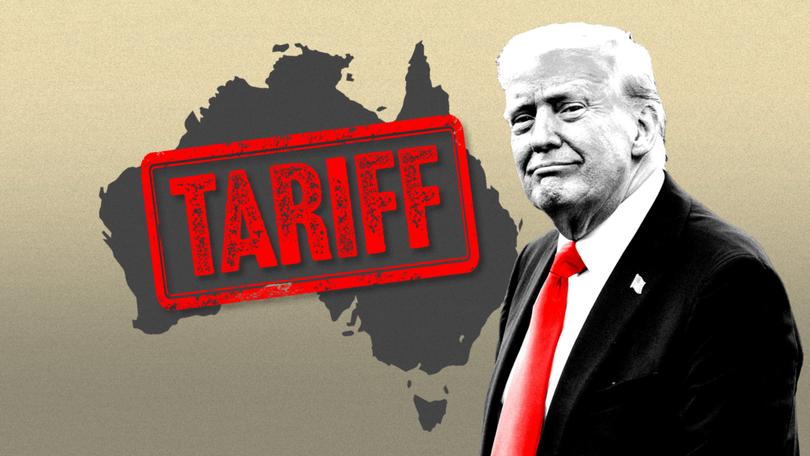Donald Trump’s ‘Liberation Day’ tariffs explained: Australia and the world punished by US President
Australia’s free trade agreement with the US has been thrown in the bin as tariffs are imposed.

Sweeping US tariffs will trigger a complete global economic reorganisation, with no country spared significant imposts beginning at midnight US time.
A minimum 10 per cent will be applied to every exporter to the United States, including Australia, but even higher tariffs will be placed on other nations the US President Donald Trump believes have been “ripping us off” for years.
China will be hit with an additional 34 per cent tariff on top of the steep tariff already, while the European Union will be charged 20 per cent.
Sign up to The Nightly's newsletters.
Get the first look at the digital newspaper, curated daily stories and breaking headlines delivered to your inbox.
By continuing you agree to our Terms and Privacy Policy.The US Trade Representative, in a 400-page report released Wednesday, detailed tariff and non-tariff barriers across 61 countries and Mr Trump, standing in the Rose Garden Wednesday afternoon (US time), held up a chart showing how 25 countries would be affected.
Developing countries, including Vietnam, Thailand, Indonesia and Malaysia are getting hit with tariffs ranging between 25 per cent and 46 per cent.
Hi-tech US allies have not been spared, with Mr Trump calling out Japan, Taiwan and South Korea for being beneficiaries of American largess when it comes to defence and technology transfer, allowing them to build up their own manufacturing base.
Taiwan, the centre of the semiconductor industry, is particularly hard hit with a 32 per cent tariff, while Japan and South Korea will receive tariffs of 24-25 per cent.
According to analysis, the weighted average of the tariffs is 30 per cent, higher than the 20 per cent tariff under the Smoot-Hawley Act of 1930, that exacerbated the Great Depression.
Mr Trump policy intends to use the punitive tariffs on trading partners to force manufacturering back to the US to “make America wealthy again”.
“For decades, our country has been looted, pillaged, raped and plundered by nations near and far, both friend and foe alike, American… workers watched in anguish as foreign leaders have stolen our jobs and foreign scavengers have torn apart our once beautiful American dream.,” Mr Trump said.
“Our country and its taxpayers have been ripped off for more than 50 years, but it is not going to happen anymore”.
Australia’s Free Trade Agreement, in force since 2005 has been thrown in the dustbin, now subject to a minimum 10 per cent tariff like all other nations.
Mr Trump called out Australian cattle farmers as an example of “unfair” non-tariff barriers.
“We’re also standing up for our great farmers and ranchers, who are brutalised by nations all over the world, brutalised.
“Australia… and they’re wonderful people, wonderful everything, but they banned beef,” Mr Trump said, referring to Australia’s strict rules on biosecurity.
“Yet we imported $3 billion of Australian beef from them just last year alone.
“They won’t take any of our beef. They don’t want it because they don’t want it to affect their farmers. And you know what? I don’t blame them, but we’re doing the same thing right now, starting at midnight tonight.”
Fortunately, Australian beef has not been banned from American markets, but still will be subject to the 10 per cent tariff, along with lamb.
National Farmers’ Federation president David Jochinke described the move as “dumb economic policy from the US”.
“It’s severely disappointing given the history and depth of our partnership with the US,” Mr Jochinke said.
“This will result in some pain for farmers here, but ultimately it’s the US public who will wear the cost of this at the checkout.
Our second largest export to America, pharmaceuticals, has been spared, with the US deciding not to place reciprocal tariffs on the product. That is good news for CSL, our largest biotech with a global footprint with extensive operations in Switzerland. That nation has been hit with a 31 per cent tariff.
Australia’s content production industry, which saw record expenditure from foreign titles (mostly American) of $1.22b in 2022 for films like The Fall Guys has also had a reprieve as long as 20 per cent of its value is US originating.
Business groups have described the application of tariffs as an “act of self harm which has the potential to create a trade war and inflict significant damage to the global economy,” but have called on the Government not to introduce reciprocal tariffs.
“There is no benefit to Australian consumers, businesses and producers by retaliatory tariffs and we agree with the decision of the Australian Government to rule them out,” Australian Chamber of Commerce and Industry chief executive Andrew McKellar said.
The Australian

